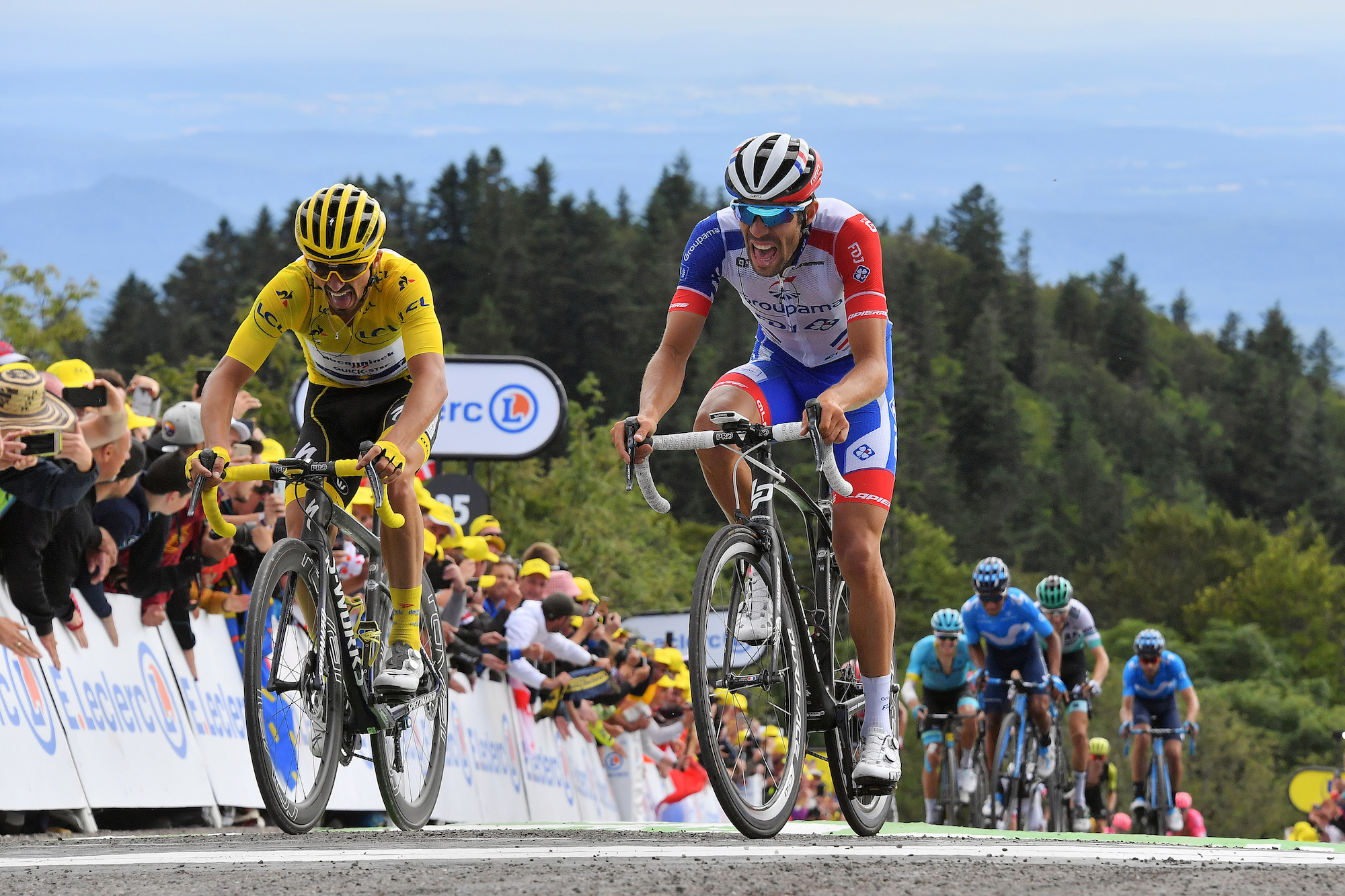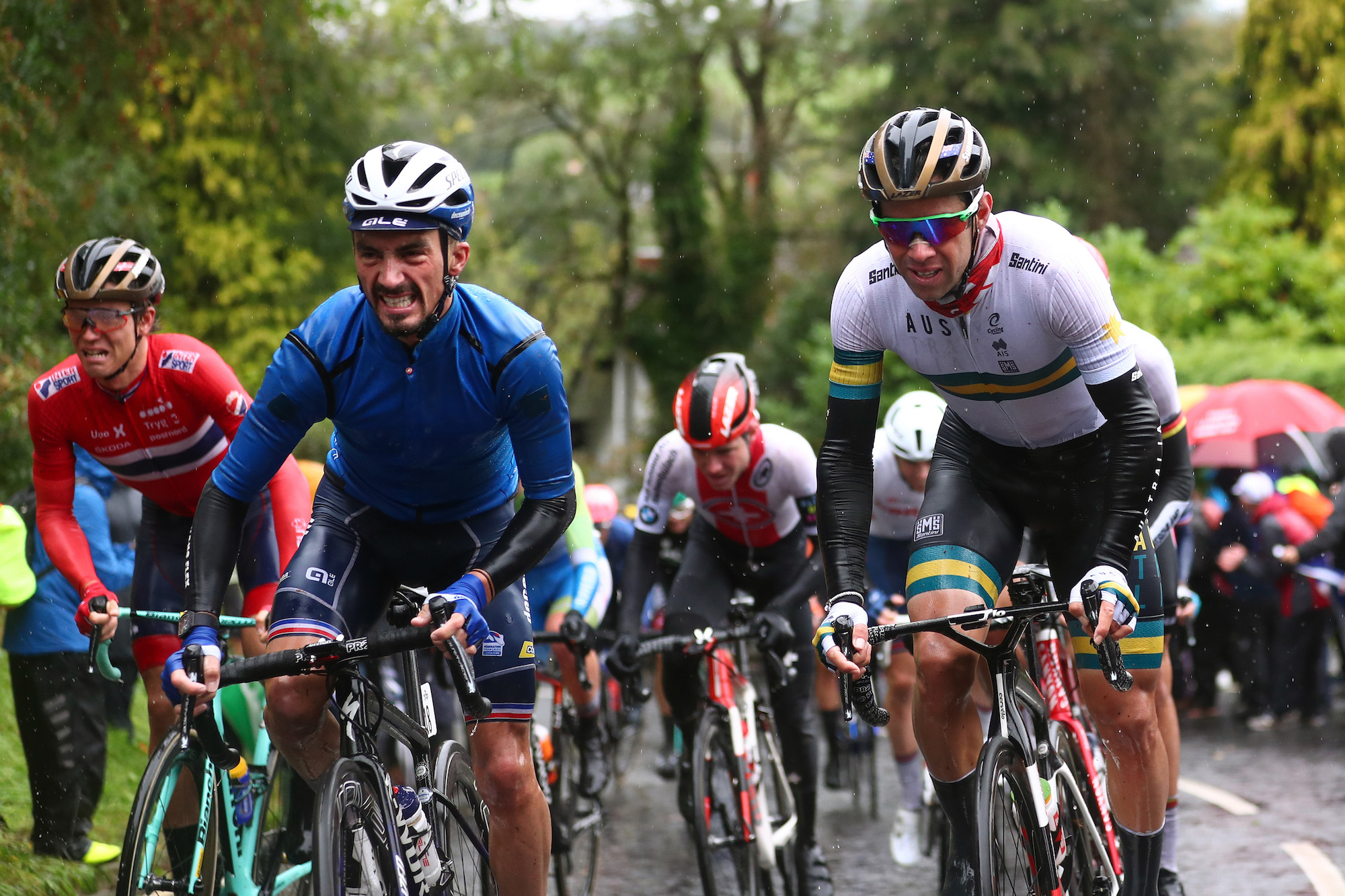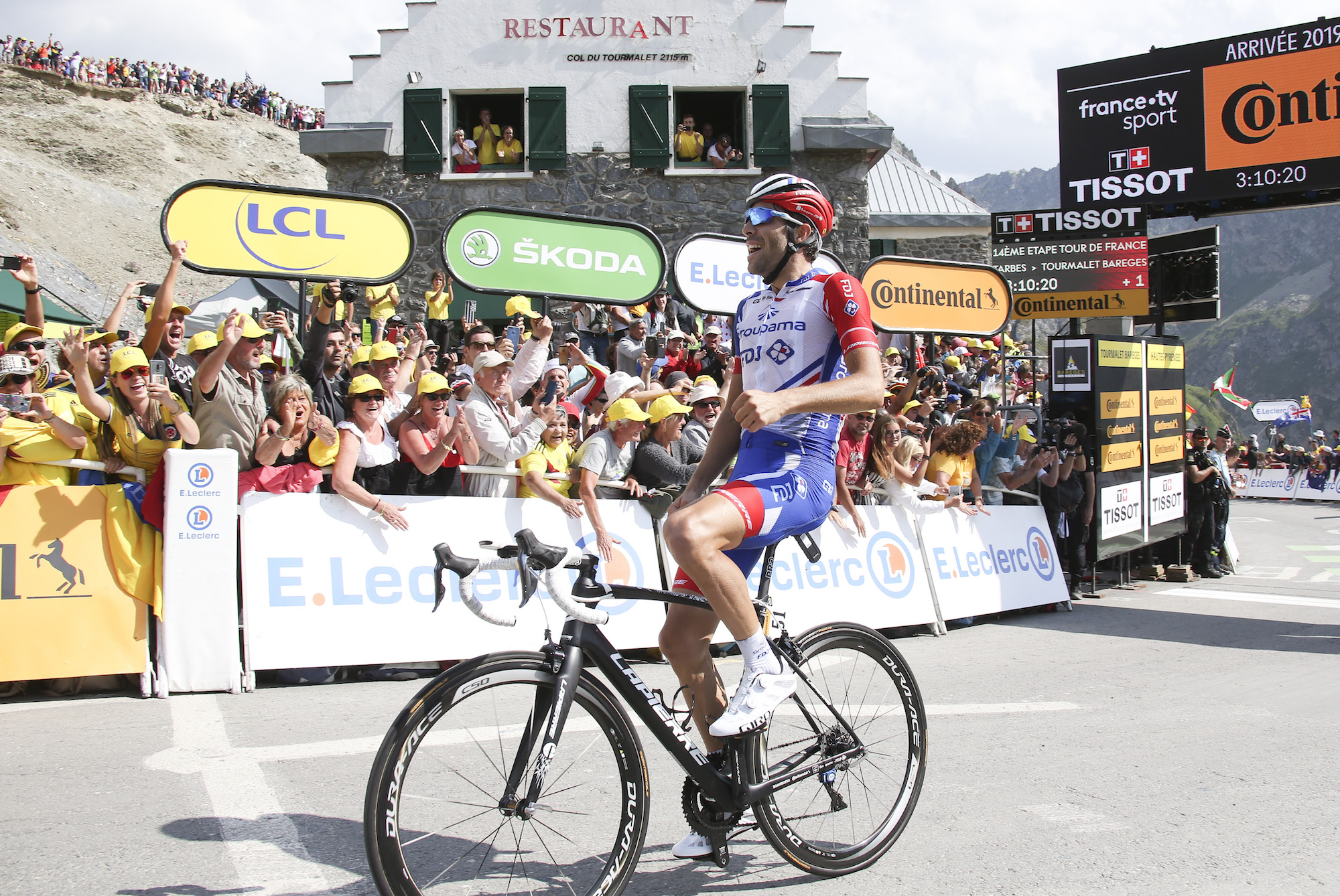First light of a new dawn: The resurgence of French cycling
French riders caught the popular imagination at the Tour de France last year, highlighting how the likes of Julian Alaphilippe and Thibaut Pinot are breathing new life into a sport that has long wallowed in the French doldrums

Julian Alaphilippe and Thibaut Pinot at the 2019 Tour de France (Photo by Bernard Papon-Pool/Getty Images)
Let’s start with some stats: 40 years since the last victory in Liège-Bastogne-Liège; 35 since the last in the Tour de France; 31 since the last Giro d’Italia; 28 years since the last Tour of Flanders; 25 since the last Vuelta a España; 23 since the last Paris-Roubaix and World Championship win. This is the record of France’s male cyclists in cycling’s most prestigious events.
To a large extent, these numbers explain why cycling has lost its lustre in one of racing’s traditional powers over the past three decades. Combined with innumerable doping scandals, cycling has steadily slid down the sporting hierarchy, mirroring declines in both Italy and Spain. Once able to put football in the shade, during the summer at least, bike racing has been anchored in the doldrums for so long that a host of other sports have caught and sailed past it, notably Formula 1, basketball and rugby.
Finally, though, there is a sense of renaissance. In 2016, Arnaud Démare ended a long winning drought at Milan-San Remo, his success emulated last year by Julian Alaphilippe. In 2018, Thibaut Pinot delivered a first French success at Il Lombardia for more than two decades. During that same period, Romain Bardet twice finished on the Tour de France podium, while Alaphilippe and Pinot both lit up last year’s edition, the former almost pulling off the most unlikely of overall victories, the latter looking set to inherit his compatriot’s yellow jersey until an unusual thigh injury forced him to abandon. "I was sure that Pinot was going to win," eventual champion Egan Bernal admitted during the off-season break.
What’s more, this resurgence in French fortunes looks likely to be sustained. Coming up behind these renowned names is a swathe of younger talent, including Benoît Cosnefroy and Pierre Latour at Ag2r La Mondiale, David Gaudu and Valentin Madouas at Groupama-FDJ, Guillaume Martin at Cofidis, Elie Gesbert at Arkéa-Samsic, and Rémi Cavagna and Florian Sénéchal at Deceuninck-Quick Step. French cycling is on the up, its biggest names not only rivalling the best for major titles, but also attracting new fans to the sport.
>>> Subscriptions deals for Cycling Weekly magazine
There’s no single reason why this new wave of French talent has emerged. The tightening of anti-doping legislation and the improvement in testing procedures leading to an end of cyclisme à deux vitesses has been cited. At the same time, leading French teams have been better funded and, more significantly, successes by certain riders such as Bardet, Pinot and Warren Barguil have encouraged others to believe that they too can compete at the highest level. This is particularly true of younger riders who, like prodigies such as Bernal, Tadej Pogacar and Remco Evenepoel, have also benefited from an improvement in training knowledge and methods that have facilitated the step up from under-23 racing to the senior peloton.
Tour and Worlds aim
The latest race content, interviews, features, reviews and expert buying guides, direct to your inbox!

When racing restarts, it seems highly likely that France’s recent rise will continue, as will the rewriting of those dismal stats. The nation’s standard-bearers will be devoting particular attention to the Tour and the road World Championships, the last French wins in those events dating back, respectively, to Bernard Hinault’s fifth yellow jersey in 1985 and Laurent Brochard’s rainbow jersey success in 1997.
Following the restructure of the calendar, these two races are, for this one season at least, inextricably linked, with the Tour due to finish on 20 September and the Worlds set to take place one week later. Although the odds would probably be long on the French winning both titles, this wouldn’t be as big a surprise as it would have been four or five seasons ago. At that point, French riders were still on the periphery. However, after Démare nudged open the door to success in major events with his Milan-San Remo win, Alaphilippe has drop-kicked it off its hinges.
Primož Roglič may be the world’s number one rider, but there’s no doubt about its biggest star at the moment, the Frenchman’s swashbuckling feats putting even arch-showman Peter Sagan in the shade. By winning San Remo, Strade Bianche, Flèche Wallonne and grabbing the headlining role at the Tour, the Deceuninck-Quick Step rider was barely out of the headlines last season. France’s roads remain testament to the popular euphoria he triggered, "Allez JuJu" never long in appearing.
Home fans may be expecting a repeat when the Tour gets under way at the end of this summer, but Alaphilippe is playing down his GC prospects. "I won’t be targeting the overall classification," he recently told L’Équipe. He will instead go into it looking for stage wins. He acknowledges, though, that his explosive qualities and racing verve might push him into contention, which would whip up JuJu-mania once more. Last year, he not only fed off, but actively encouraged this feverish acclaim, and it’s unlikely that such a flamboyant performer would be able to resist its pull once again.
Pierre Carrey, cycling correspondent at Libération, describes Alaphilippe as the most thrilling racer France has produced for more than a generation, but is concerned that too much is expected of a rider who, for now, is at his best in one-day and week-long races. "He will have to change his preparation if he really wants to target the yellow jersey, and doing so might well remove some of the enjoyment he gets from competing. He’ll need to rein himself in and be more cautious," he says. Carrey believes this might happen in a couple of seasons, but expects Alaphilippe to continue with his current line of conquest, with the Worlds, Liège and, new for this year, Flanders as his next objectives.
Carrey picks out Pinot as the French rider most likely to end their long Tour drought, highlighting how the Groupama-FDJ leader has steadily come to terms with the immense pressure that a yellow jersey challenge heaps on any home contender. "He stopped enjoying racing in France, made the choice to focus on the Giro for a couple of seasons, but during that time he realised how much he loves the Tour. He now looks far more capable of dealing with the challenge it presents," says Carrey. "The fact that he was happy for a France Télévisions crew to follow him throughout the 2019 Tour backs this up. He wouldn’t have wanted to be in the spotlight like that before."
High expectations

This programme captured some great moments, notably the exultation of Pinot’s victory on the Tourmalet and the devastation of his injury-enforced abandon on the Alpine stage to Tignes. It helped to catapult him into the heart of France’s sporting conscience. Naturally introverted and far happier at home in the Vosges looking after a menagerie that includes sheep, goats and a llama than as a sporting celebrity in the public eye, Pinot would have shied away from this focus, but now accepts it as inevitable if he is to win the Tour, which he affirmed is his principal aim when, in early June, he agreed a three-year extension to his contract with Groupama-FDJ.
>>> Cycling Weekly is available on your Smart phone, tablet and desktop
As Alaphilippe and Pinot’s stars have risen, Bardet’s has faded, to the extent that his capture of the polka-dot jersey in last year’s race went almost unnoticed. A very disappointing 15th on GC, his worst finish since his debut in 2013, the mountains classification offered a touch of consolation, although it wasn’t captured with the same swagger that Alaphilippe and Barguil had shown in 2018 and 2017 respectively.
Having borne French Tour hopes in recent seasons, he’s responded to this eclipse with a Pinot-like reassessment of his goals. The restructuring of the season has meant his plans to target the Giro and Olympic road race have had to be forsaken until next year. But, like Alaphilippe, he’ll ride the Tour looking for stage wins and hoping to reach peak form for the Worlds a week later. "The world champion’s jersey is something that’s sorely lacking in French cycling, it stands above everything apart from the yellow jersey," Bardet said earlier this season, adding that this year’s championship "is going to be a very important race for French cycling".
Like Innsbruck in 2018, where Bardet took silver behind Alejandro Valverde, the Martigny course appears tailor-made for the French. Under the guidance of coach Thomas Voeckler, who has already selected Bardet, Alaphilippe and Pinot as his leaders, France expects. What’s different to many points over the last three decades is the probability of that expectation being fulfilled. In the event the yellow and rainbow jerseys don’t arrive this year, they do look likely to come soon. But if these titles do fall to French riders, at a time when other major sports are still re-emerging from hibernation, it would likely result in a significant shift in public awareness and support for the sport, signalling a renaissance that is long overdue.
This feature originally appeared in the print edition of Cycling Weekly, on sale in newsagents and supermarkets, priced £3.25.
Peter Cossins has been writing about professional cycling since 1993, with his reporting appearing in numerous publications and websites including Cycling Weekly, Cycle Sport and Procycling - which he edited from 2006 to 2009. Peter is the author of several books on cycling - The Monuments, his history of cycling's five greatest one-day Classic races, was published in 2014, followed in 2015 by Alpe d’Huez, an appraisal of cycling’s greatest climb. Yellow Jersey - his celebration of the iconic Tour de France winner's jersey won the 2020 Telegraph Sports Book Awards Cycling Book of the Year Award.